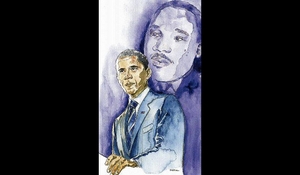
Portrait of US President-elect Barack Obama shadowed by the memory of Dr Martin Luther King Jr.
In his memoir 'Walking With the Wind', US Congressman John Lewis (Democrat from Georgia) writes poignantly of his growing up years in rural Alabama and of his later involvement in the civil rights movement of the 1950s and '60s.
In the prologue, he tells a story of a time one Saturday as he and about a dozen cousins were gathered at his Aunt Seneva's house, a violent storm developed threatening to rip apart the wooden structure in which she lived. As they observed the wind lifting one part of the floor from the kitchen to a bedroom in other parts of the house, Seneva instructed the small children to join hands and walk towards the sections of the house that were being lifted, to use the collective weight of their bodies to keep the house from being torn apart. The house survived the storm.
Lewis subsequently drew an analogy of the times when youthful and aged activists journeyed to different parts of the racially segregated United States to lend their collective support to others who were caught in the maelstrom of oppressive Jim Crow policies and politics. And their walking with and into the wind resulted in, among other things, the passing of legislation making it legal for black people to vote in the United States of America.
winds of change
Occasionally, the winds of change blow into national and international prominence people who have been prepared by circumstances to lead a cause or a nation, according to the needs of their time.
Such is the hope deposited in Barack Obama. People sometimes forget that when Martin Luther King Jr was propelled into leadership of the civil rights movement, amid much contention and personality clashes among more seasoned and wizened campaigners, he was a mere lad in his mid-20s.
But as Taylor Branch so brilliantly scripted in his books - Parting the Waters and Pillar of Fire - King was carried along by the forceful desire of a people wanting change and finding in him the personage who could articulate their hopes and aspirations.
grass-roots campaign
As it was with MLK, so it was with Obama - a mainly grass-roots campaign supported by people of goodwill, a potpourri of ethnic groups who were not scared to be labelled radicals or supporters of terrorism, but who insisted on taking a stand for what is decent and right.
Of course, there was a convergence of factors that helped propel Obama into the presidency - the unpopularity of Dubya, the economic meltdown and the incompetence of the McCain-Palincampaign. But beyond all of that the majority of voters could have still rejected him and maintained the status quo. Throughout much of the last year and a half, an army of aged and young Americans joined hands again to walk into the wind demanding change.
tears
And so on Tuesday, November 4, 2008, many a tear was shed as the television networks flashed the confirmation that the biracial but politically black Barack Obama would be 44th president of the United States of America.
Since then the analyses of the enormity of the task confronting him have been fast, furious and multiple. He will disappoint many and he will fail in some areas - not because he is a politician with a penchant for deception, or because he has his moral compass pointing in the wrong direction, as some no doubt believe, but because he is human. He cannot be all things to all people.
His intentions will be misunderstood and his actions misinterpreted. His words will be distorted and he will be faced with the challenges of trying to run an administration peopled by individuals with overreaching ambition.
Already, Obama has been saddled with the legacy of the Bush-Cheney-Rumsfeld policies. Unforeseen challenges will rise. The hope is that he will survive and overcome, as he did against the famed Clinton political machinery in the primaries and the virus of distortion that threatened to torpedo his campaign.
On the other side of the political divide, critical eyes have again been turned on the damaged Republican brand, and the question has been asked: How did the party of Abraham Lincoln become the party of neoconservatives drunk with hubris and misguided by religious zealotry?
It became what it is today because of success. Success at the polls from Ronald Reagan to Newt Gingrich to the Bushes was interpreted as a divine mandate to refashion a pluralistic society into their own image.
extremes
But within the cyclical nature of politics and social mores, the extremes of liberal or conservative attitudes will dominate the majority culture at different intervals. Then, as the pendulum swings away from the excesses of the times, there develops a yearning and a clamour for somethingdifferent.
Millions of people the world over are now walking with the wind of change embodied in the personhood of Barack Obama. In time, the Democrats may become drunk with their own success and another generation will be looking at dark clouds on the horizon, preparing themselves for a gathering storm. But for now millions can enjoy the gentle breeze that has cleared away the weeds and the bushes from Washington.
Feedback may be sent to colin.steer@gleanerjm.com or columns@gleanerjm.com.